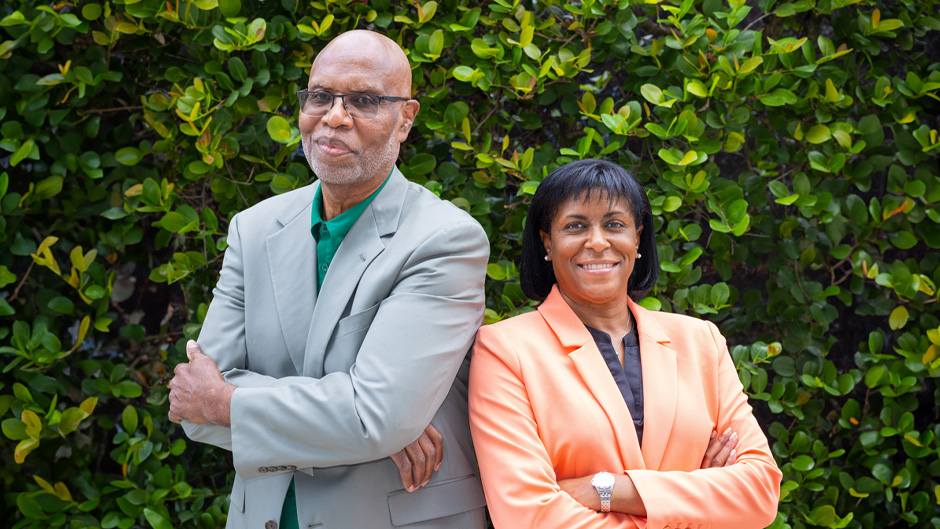The ACC UNITE Award, initiated by Atlantic Coast Conference (ACC) commissioner James Phillips, annually recognizes individuals from institutions throughout the conference who promote racial equity, social justice, and a sense of belonging.
Shirelle Jackson, executive associate athletic director of student-athlete development, and Marvin P. Dawkins, professor of sociology in the College of Arts and Sciences, have been awarded the ACC UNITE Award for their contributions to creating an inclusive and supportive environment for all student-athletes and their lifelong dedication to promoting racial equity, inclusion, and social justice within both academic and community settings.
This honor highlights the University of Miami’s commitment to fostering diversity and inclusion within its athletic community and beyond.
The award celebrates those who make significant contributions to inclusivity within their institutions and the broader ACC community. It emphasizes the conference's commitment to creating environments where all individuals feel valued and supported, regardless of their background.
Jackson and Dawkins both demonstrate exceptional leadership in advancing diversity and inclusion. Jackson has created a supportive environment for student-athletes at the University. Dawkins, a longtime sociology professor, has dedicated his career to addressing racial inequality and social justice. Dawkins' work spans over four decades, with a focus on systemic inequalities in an environment where all individuals are respected.
Their work emphasizes the importance of higher education institutions in fostering diversity and preparing students to lead efforts for social change. Together, their contributions highlight the ongoing need to build inclusive environments at the University and beyond.
“Receiving the ACC UNITE Award is an honor that underscores the importance of fostering equity and belonging in athletics,” said Jackson. The recognition of individuals like Jackson not only honors their contributions but also serves as a catalyst for continued dialogue and action toward inclusivity in athletics.
By spotlighting those who advocate for equity, the ACC reinforces its commitment to a diverse and inclusive environment, benefiting both current and future generations of student-athletes.
“For me, this work is deeply personal—I was once a student-athlete myself, and I know the impact a supportive, inclusive environment can have on an individual’s journey,” Jackson added.
“The ACC UNITE Award holds special significance for me because it honors those who promote racial equity and social justice, values that are deeply ingrained in our athletics department at the University of Miami. I’m proud of the diverse and inclusive environment we foster here,” said Jackson.
Jackson shared that nominating Dawkins for this award was an honor, as his work in promoting inclusion mirrors the goals of the athletics department.
“The ACC UNITE Award brings much-needed attention to this important work, showing that we are not doing it alone and that our efforts are recognized by the wider community,” she said.
Dawkins views the UNITE Award as a recognition of his efforts to promote the values of respect, inclusion, and belonging, both in his professional work and personal life. "This acknowledgment means that my efforts to promote the principles that have guided me both personally and professionally have not gone unnoticed," Dawkins said.
Dawkins' path to advocacy was deeply influenced by his own family, especially his parents, who graduated high school during the Great Depression, and by influential professors at the historically Black institution he attended as an undergraduate student. These experiences shaped his belief in the importance of equity and social justice.
For Dawkins, higher education plays a crucial role in advancing diversity and inclusion. He believes institutions must create experiences that allow students to engage with the positive aspects of diversity, while also preparing them to become leaders who can challenge injustices in society.
His work calls on universities to reflect on their own histories of racial and social injustice and take steps to create lasting change. Through his teaching, research, and leadership, Dawkins continues to inspire future generations to be champions of social justice and equality.
"Higher education institutions have an important role in addressing inequalities and promoting diversity and inclusion," Dawkins said.

